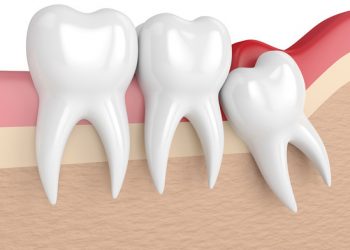
The average adult has 32 teeth, 16 teeth in the Maxilla (Upper jaw) and 16 teeth in the Mandible (Lower jaw).
The molars are the larger teeth in the back used for grinding food. The “Wisdom teeth”, or the “3rd Molars” are the last molars to erupt in the mouth, if there is enough space. Although 32 teeth develop, often only 28 teeth are able to fit in the jaw.
If there is enough space and the 3rd molars are able to erupt in their proper position and are aligned correctly to allow healthy gum tissue to develop around, the 3rd molars will not need to be removed. However, when there is not enough space, the teeth develop in an abnormal position and can grow sideways, be partially covered by gum tissue or be encased in bone.
These malpositioned impacted teeth can lead to multiple problems. Patients may experience pain when teeth are actively erupting. When teeth are partially erupted and partially covered with gum tissue, this can lead to food and bacteria being trapped and can cause an infection leading to pain and swelling. If the teeth are significantly malpositioned, they can also affect the adjacent healthy molars by making it more difficult to clean, leading to cavity formation or bone loss around the molars.
If an impacted molar is left in place, there is also a small risk of a cyst or tumor formation around the tooth which can lead to bone destruction. These problems can be prevented with early removal of impacted wisdom teeth. Early extraction of the 3rd molars will also decrease the surgical risk involved with these procedures. It is important to see a dentist or an oral and maxillofacial surgeon for an oral exam with X-rays, usually in the late teenage years, to evaluate the developing wisdom teeth and anticipate any problems.
If surgery is indicated, it will be performed under appropriate anesthesia. Your oral surgeon will discuss the appropriate options at the consultation appointment after proper evaluation of your medical history, level of anxiety and complexity of the procedure. The procedures will be carried out in a safe and comfortable environment with appropriate monitors and experienced and trained staff. After the procedure your oral surgeon will give the appropriate post operative instructions and pain medication. It is not uncommon to experience some level of pain and swelling after the procedure.

